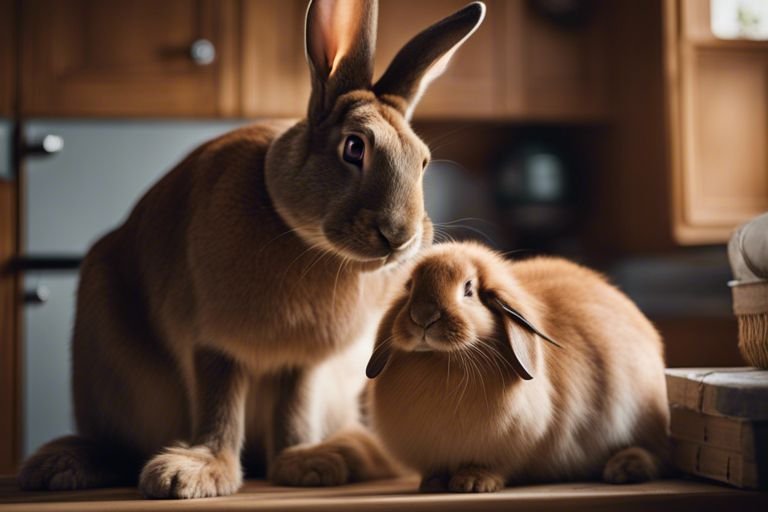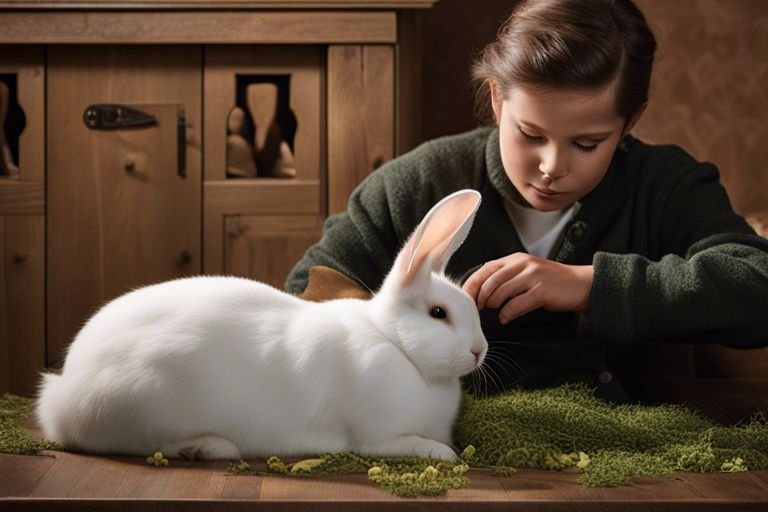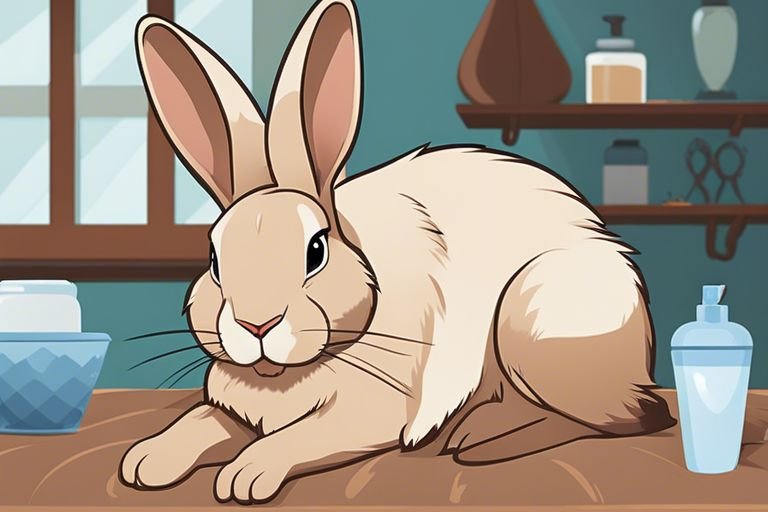Oftentimes, as owners of the majestic Flemish Giant rabbit, we may find ourselves perplexed by their grooming habits. It is not uncommon to observe these gentle giants meticulously grooming themselves for extended periods. However, what is considered normal behavior, and when should one become concerned? Understanding the reasons behind their grooming rituals and being able to distinguish between normal and abnormal grooming patterns is essential for the well-being of our beloved companions. In this blog post, we will delve into the reasons why Flemish Giant rabbits groom themselves and provide insights into what constitutes healthy grooming behavior.
Key Takeaways:
- Instinctual Behavior: Grooming is a natural instinct for Flemish Giant rabbits as they keep themselves clean and maintain their fur health.
- Social Interaction: Grooming can also be a social behavior for rabbits, as they may groom themselves to show submission or bond with their owners or other rabbits.
- Temperature Regulation: Grooming helps Flemish Giants regulate their body temperature by removing excess fur and assisting with heat dispersion.
- Health Maintenance: Regular grooming is essential for the overall health of Flemish Giant rabbits, as it prevents matting, reduces the risk of parasites, and stimulates the circulation of blood and oils in their skin.
- Normal Behavior: It is normal for Flemish Giant rabbits to spend a significant amount of time grooming themselves, and occasional grooming from their owners can also be beneficial for their well-being.
Understanding Flemish Giant Rabbit Behavior
Clearly, understanding the behavior of your Flemish Giant rabbit is essential for any rabbit owner. Rabbits, including Flemish Giants, have their own unique behaviors and communication methods. If you have noticed your male Flemish Giant acting strange, it’s important to consider seeking advice from online forums or veterinary professionals, such as Male Flemish Giant acting weird.
Normal Grooming Practices
Behavior such as grooming is a vital part of a rabbit’s daily routine. Grooming not only helps keep their coat clean and free of parasites, but it also serves as a way for them to relax and self-soothe. It’s completely normal for Flemish Giant rabbits to spend a significant amount of time grooming themselves, as it is a positive and important aspect of their behavior.
Signs of Over-Grooming and Concern
Rabbits may over-groom if they are stressed, anxious, or experiencing skin irritations. Over-grooming can lead to hair loss and skin issues, so it’s crucial to monitor your rabbit for any signs of excessive grooming. If you notice bald patches, red or irritated skin, or a change in their grooming behavior, it’s essential to seek veterinary care for your Flemish Giant.
With a breed as large and majestic as the Flemish Giant, it’s important to pay close attention to their grooming habits and behaviors. Any deviation from their normal grooming routine could be a sign of an underlying health issue, which should be addressed immediately for their well-being.
Factors Influencing Grooming Habits
Obviously, several factors can influence the grooming habits of your Flemish Giant rabbit. Understanding these factors can help you determine what is normal for your furry friend. Here are some of the main influences:
- Health and hygiene
- Environmental influences
- Behavioral patterns
- Comfort and stress levels
After considering these factors, you can better understand why your Flemish Giant rabbit grooms itself and what is considered normal behavior.
Health and Hygiene
One of the most important factors influencing grooming habits is the health and hygiene of your Flemish Giant rabbit. Ensuring that your rabbit is free from parasites, has a clean living environment, and maintains a balanced diet can significantly impact its grooming habits. A healthy and well-groomed rabbit is more likely to have a shiny coat and spend less time grooming itself.
Environmental Influences
Influences in the environment such as temperature, humidity, and living space can also affect the grooming habits of your rabbit. Rabbits may groom themselves more during hot weather to cool off and remove excess fur. Additionally, a comfortable and spacious living area can promote positive grooming behaviors in rabbits.
Plus, the presence of other animals or loud noises in the environment can cause stress in rabbits, leading to excessive grooming as a coping mechanism. It’s essential to create a calm and safe environment for your rabbit to minimize stress-induced grooming.

Guidance for Rabbit Grooming
After learning about the natural grooming behavior of Flemish Giant rabbits, it’s important to provide guidance to support their grooming habits. This will help ensure their well-being and overall health.
How to Support Natural Grooming Behavior
Grooming is an essential part of a Flemish Giant rabbit’s routine, and as a responsible owner, there are steps you can take to support this natural behavior. Firstly, provide your rabbit with a suitable environment that encourages grooming, such as a clean and spacious living area with appropriate bedding. Additionally, include safe chew toys and grooming brushes to assist in their grooming process. Lastly, ensure a balanced diet with plenty of fiber to help maintain a healthy digestive system, which ultimately contributes to their grooming routine.
When to Intervene in Your Rabbit’s Grooming
Behavior observation is crucial in knowing when to intervene in your rabbit’s grooming. Keep an eye on any excessive grooming, as this could indicate an underlying health issue or potential stress. If you notice your rabbit struggling to groom certain areas or neglecting their grooming altogether, it may be necessary to seek veterinary advice. Additionally, be mindful of any changes in behavior or appearance that could signal the need for intervention.
Intervene promptly if you notice any abnormal grooming behavior, as this can be an indication of health issues that require attention. Regular monitoring and grooming support will help ensure your Flemish Giant rabbit stays happy and healthy.

Conclusion
Drawing together our understanding of the grooming behaviors of the Flemish Giant rabbit, it becomes clear that grooming is a natural and essential part of their behavior. Through grooming, these rabbits are able to maintain cleanliness, regulate body temperature, and establish social bonds with other rabbits. It is important for rabbit owners to be aware of what constitutes normal grooming behavior for their Flemish Giant, as excessive grooming or changes in grooming habits can be indicative of health issues. By observing and understanding their rabbit’s grooming habits, owners can ensure the well-being and happiness of their beloved pets.
FAQ
Q: Why does my Flemish Giant rabbit groom itself?
A: Grooming is a natural behavior for rabbits, including Flemish Giants. They groom themselves to keep their fur clean and free of debris, as well as to regulate their body temperature. Grooming also helps rabbits maintain their natural oils and odors, which are important for social communication with other rabbits.
Q: What’s normal grooming behavior for a Flemish Giant rabbit?
A: Normal grooming behavior for a Flemish Giant rabbit includes licking and nibbling at their fur, as well as using their front paws to clean hard-to-reach areas. They may spend several hours a day grooming themselves, especially during times of shedding or when they are feeling stressed. It’s important to note that excessive grooming, such as fur pulling or over-grooming to the point of bald patches, may indicate an underlying health issue and should be addressed by a veterinarian.
Q: How can I support my Flemish Giant rabbit’s grooming habits?
A: To support your Flemish Giant rabbit’s grooming habits, provide them with a clean and safe environment. This includes regular cage cleanings, as well as brushing and grooming your rabbit to help remove loose fur and prevent matting. Additionally, a balanced diet and access to fresh water are essential for maintaining healthy coat condition. Lastly, providing your rabbit with appropriate toys and objects to chew on can help reduce stress and minimize over-grooming tendencies.
